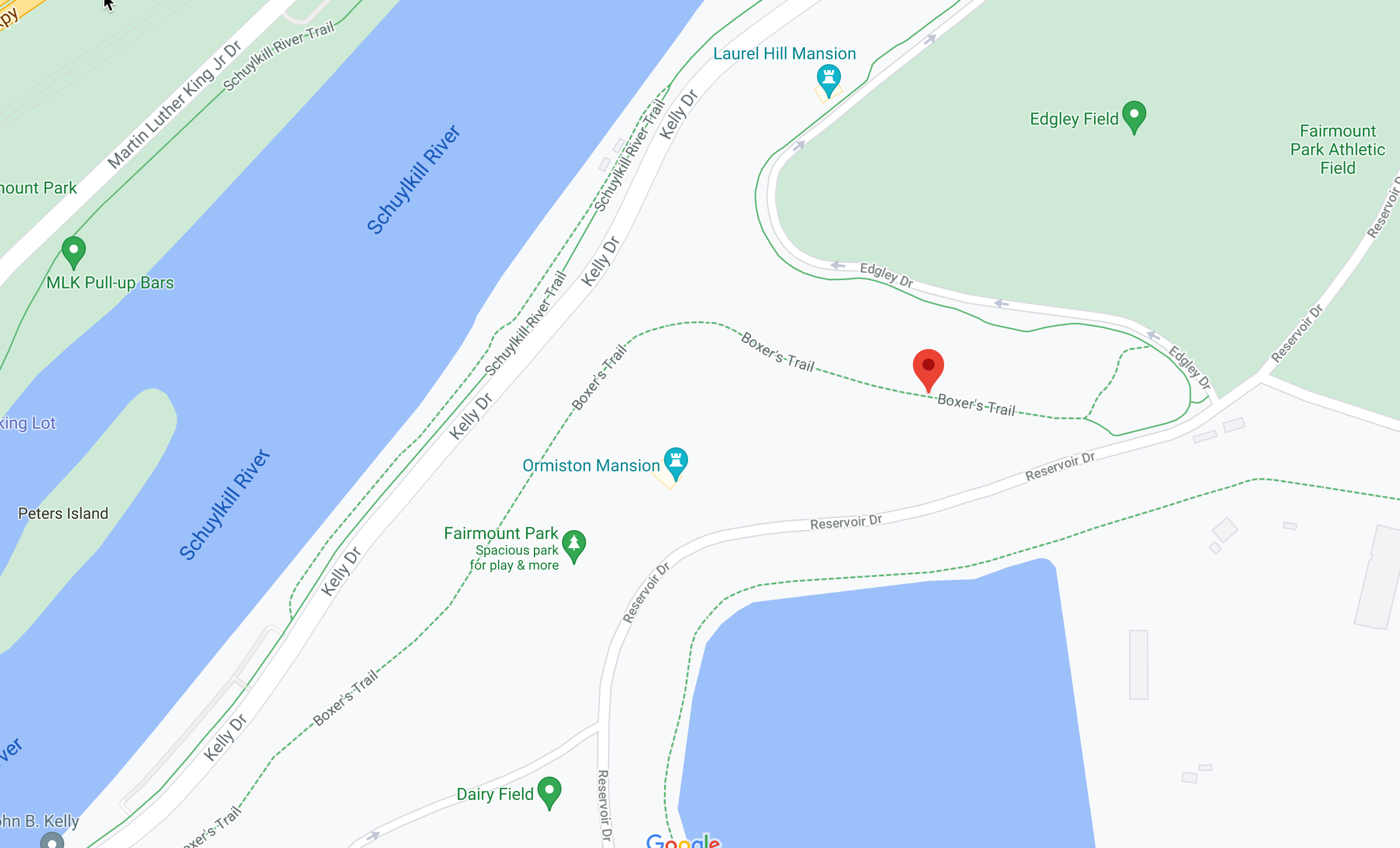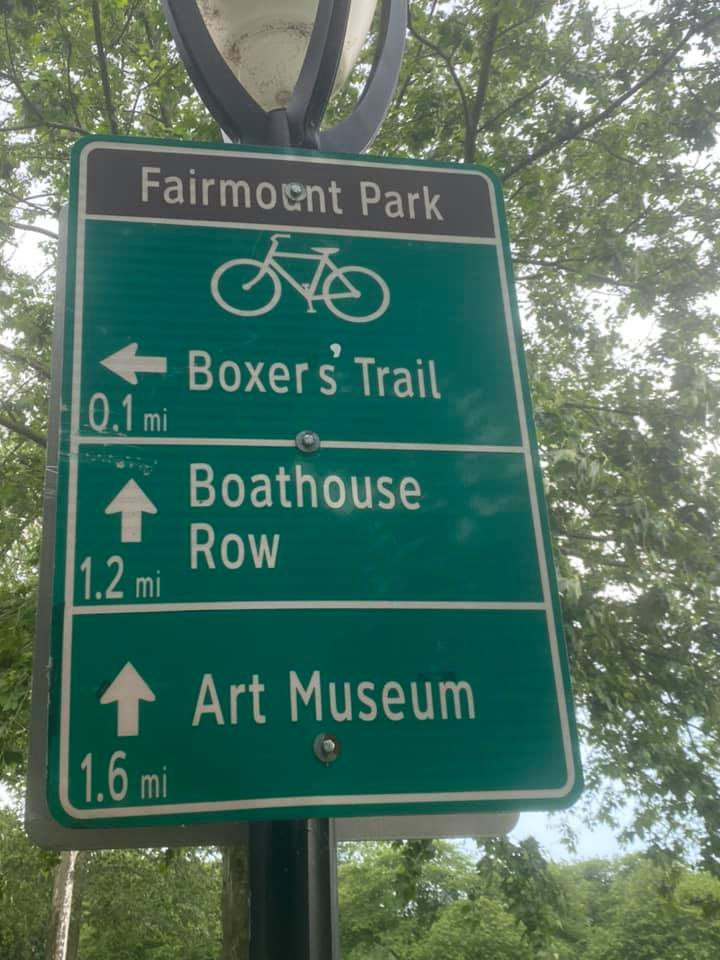Signs and wonders
« previous post | next post »
I thought you might enjoy this as yet officially unreported dispute about a sign being posted in Phil. The sign originally said, "Boxer's Trail," because Joe Frazier famously ran along it to train, and later Ali ran on it once to psyche out Joe (Ali worked out in Overbrook, apparently). Someone or other complained that more than one boxer had used the trail, and so they had to move the apostrophe. Meanwhile, people are arguing about whether the trail should be dedicated to Frazier, or to all boxers. And then someone of course had to throw in a question about whether any of the boxers had boxers (dogs) and if then it should say boxers' boxers trail or boxer's boxers trail, and so on.
Here's the map location, if you're in the area and want to check it out:

This reminds me of the antics of the Typo Eradication Advancement League ("TEAL"), except that the trail-sign discussion is really more about meaning than about orthography.
According to a 2008 Guardian story:
For centuries, travellers have crossed America to explore it, conquer it, settle it, exploit it and study it. Now, a small but righteous crew are traversing America in order to edit it. Jeff Deck, and his friends at the Typo Eradication Advancement League (Teal), are spending three months driving from San Francisco, California, to Somerville, Massachusetts, on a mission to correct every misspelled, poorly punctuated, sloppily phrased item of signage they encounter en route. Equipped with marker pens, stickers and white-out, they are seeking to scourge America's landscape of floating apostrophes, logic-defying syntax and other manifestations of laziness and/or illiteracy.
For more background, see "Angry linguistic mobs with torches", 4/16/2008, which includes some lovely anecdotes. And for TEAL's eventual comeuppance, see "'Grammar vigilantes' brought to justice", 8/22/2008 — their crime was precisely to deface a sign by moving an apostrophe:
Some other apostrophical posts:
"A soul candidly acknowleging it's fault", 6/9/2004
"Apostrophe catastrophe", 1/31/2009
"Apostropocalypse Now", 1/15/2012
"Apostropocalypse again", 12/1/2019


Philip Taylor said,
June 12, 2021 @ 10:40 am
A shame that no-one bothered to close up the gap between the "r" and the "s" after painting out the original apostrophe and inserting the new one …
Robert Coren said,
June 12, 2021 @ 10:41 am
And then someone of course had to throw in a question about whether any of the boxers had boxers (dogs)
Or, for that matter, what type of underwear they wore.
Y said,
June 12, 2021 @ 11:59 am
Guys! Guys! Let's not fight about it. We'll make it "Boxer’s’ Trail".
David Marjanović said,
June 12, 2021 @ 12:42 pm
"Let's you and him fight!"
J.W. Brewer said,
June 12, 2021 @ 3:44 pm
Yet somehow "Boathouse Row" rather than "Boathouses' Row" is perfectly cromulent even if one knows that there are a plurality of boathouses involved.
Kimball Kramer said,
June 12, 2021 @ 5:45 pm
Is "Phil" a standard abbreviation for Philadelphia? Maybe the sign was posted BY Phil. Or the sign was reproduced in phull.
Richard Hershberger said,
June 12, 2021 @ 7:03 pm
@Philip Taylor: Clearly we need a Kerning Crew to follow in the steps of the grammarians.
Viseguy said,
June 12, 2021 @ 9:45 pm
@Philip Taylor: I had the same first reaction.
On balance, I think that Boxers Trail would cover the range of semantic possibilities, while avoiding the visual/mental distraction of the apostrophe.
Keith said,
June 13, 2021 @ 1:58 am
In this construction, I take "boathouse" to be a noun functioning as an adjective, and adjectives are invariable in English.
If you make a chowder out of clams (plural), it is a clam (singular) chowder. If you have a cat that catches mice (plural), it is a good mouse (singular) catcher. You don't encounter *clams chowder or a good *mice catcher.
So a row (in the sense of street, not of argument or dispute) with a number of boathouses (plural) along, it is Boathouse (singluar) Row.
John Walden said,
June 13, 2021 @ 2:11 am
I'm curious about decimal fractions of a mile. I think in Britain 0.1 mi would be in yards on a similar sign, though I'm not sure.
J.W. Brewer said,
June 13, 2021 @ 8:26 am
Keith's analysis is perfectly fair, and also explains why "Boxer Trail" would be perfectly cromulent. But (at least for naming streets, roads, trails and suchlike things) that construction is not the only possibility, which is why Boxer[']s['] Trail is also an available option. With a lot of instances of the form NOUNs Road it may be hard to tell etymologically if it was NOUN's Road and the apostrophe was lost orthographically (many bureaucracies in charge of toponyms and street names have apostrophe-hostile formal policies) or not, i.e. whether the "s" was the plural marker or the genitive singular marker.
If you wanted to be less generic and make it clear that Smokin' Joe was the specific individual you were naming it for, Frazier Trail, Frazier's Trail, and Fraziers Trail all seem like available options.
John Swindle said,
June 13, 2021 @ 11:32 am
"Boxing Trail" would eliminate the confusion about dogs, underpants, and apostrophes but might lead us to expect cardboard and strapping tape.
maidhc said,
June 13, 2021 @ 6:59 pm
It all began in 1890 with the creation of the U.S. Board on Geographic Names, an executive branch office that still keeps the government’s database of official names. The official policy is to discourage the use of possessives, which imply that a geographical location belongs exclusively to a person or group of people, rather than belonging to the public as a whole. In practice possessives are permitted as long as there is no apostrophe. There are only five exceptions to this rule, mostly to avoid misleading spellings. Hence places like Angels Landing, Pikes Peak, etc., officially have no apostrophe.
The Board does not have any real enforcement mechanism, except possibly in the establishment of post offices. (Post offices are not supposed to have confusing or ambiguous names. In some cases the Post Office has told towns that they have to change their name if they want to have a post office.)
The Board's authority extends to places that have names at a federal level, such as places within a national park, or appearing on official maps. Policies on “administrative” features (airports, schools, etc.) are not enforced. A trail name in a municipal park (I assume that's what it is) would not be regulated.
Trogluddite said,
June 13, 2021 @ 8:18 pm
@John Walden
Yes; that's right. In fact, those "decimal miles" would be unlawful anywhere on a publicly accessible (not just state maintained) highway in the UK. Below half a mile, destination distances in yards ("yards" or "yds") to the nearest ten are allowed. Any destination distance may be expressed in miles ("miles", "m", or unitless numbers); if below three miles, this must be to the nearest quarter mile, otherwise to the nearest mile. So only the fractions 1/4, 1/2, and 3/4 may ever appear lawfully.
Alexander Browne said,
June 13, 2021 @ 8:36 pm
So would "Pugilist Trail".
Philip Taylor said,
June 14, 2021 @ 2:39 am
Trogluddite — Good Lord. I have lived in the UK for 74 years, and never knew our road signage was so mandated. Do you have any link to the definitive text ?
/df said,
June 14, 2021 @ 7:39 am
This "small but righteous crew" had better take (or have taken, 2008) care to avoid pedant hunters: https://b3ta.com/board/3356429
Trogluddite said,
June 14, 2021 @ 9:14 am
@Philip Taylor
If I haven't fluffed my HTML, you should be able to find it here…
The Traffic Signs Regulations and General Directions 2016
The specifics for destination distances are in Schedule 18, Part 3 of the document.
That I should even know where to look is testament to a boring-car-journey game that I played as a lad: imagining the warps in space-time necessary to account for accumulated rounding errors of road sign distances. Yes, I was (and still am) a rather odd boy!
Ken said,
June 14, 2021 @ 9:19 am
@maidhc: Is that why so many city names are missing possessive apostrophes? One example is Funks Grove (https://en.wikipedia.org/wiki/Funks_Grove,_Illinois), the community. It is named after Funk's Grove, the small forest, which retains its apostrophe and was originally named for Isaac Funk.
Robert Coren said,
June 14, 2021 @ 10:05 am
I suppose that no-apostrophe rule might also explain Kings and Queens counties in New York.
There are streets in several municipalities in the Boston area named Roberts Road. I have always assumed that they were named after someone whose surname was Roberts, despite my husband's joking that they belong to me.
Andy Stow said,
June 14, 2021 @ 10:16 am
Did the author of the Guardian article make a language error?
"…seeking to scourge America's landscape of floating apostrophes…"
Surely "scourge" should be "scour." Perhaps in their head they had "the scourge of floating apostrophes…" in mind.
Philip Taylor said,
June 14, 2021 @ 10:55 am
Not even "scour" works for me (in my idiolect, one scours something for something, at least in a metaphorical context such as this — "I scoured the landscape for signs of life"). For me, it seems more possible that the author intended "purge", but perhaps (accidentally or otherwise) coined a portmanteau word in the process — "scour the landscape looking for .. and then purge it of all those found".
David Marjanović said,
June 14, 2021 @ 11:50 am
That might be accurate now, but it's not where it comes from. German does the same thing, in that nouns used as prefixes in compounds are usually in their singular form regardless of semantics, but there there's no way to argue these nouns are really adjectives. Rather, Germanic compound nouns were, once upon a time, formed by using the bare stem of all but the last noun; and that has become identical to the entire singular in English, and to at least the nominative singular in most cases in German.
This is beautifully seen in a few very old compounds, like Tagewerk "day's work" and Tagelöhner "day labourer". They were formed in a time when the stem was taga-, i.e. before German was ever written; nowadays, the nominative/accusative(/dative) singular is Tag, and Tage is the nominative/genitive/accusative plural (and the archaizing dative singular), so the semantically inapt plural is what people think of when they encounter these highly literary words.
Batchman said,
June 16, 2021 @ 5:14 pm
@Robert Coren: "I suppose that no-apostrophe rule might also explain Kings and Queens counties in New York." Also (The) Bronx.
Robert Coren said,
June 17, 2021 @ 9:04 am
@Batchman: Well, it doesn't explain that "x".
Philip Taylor said,
June 17, 2021 @ 9:53 am
« it doesn't explain that "x" ». Terminal "x" also appears in (some spellings of) "socks" ("sox"), "strips connection" ("strips connexion"), and so on, tho' I do not ever recall seeing a terminal "x" in a possessive. Not that I knew (or even suspected) that "Bronx" was a possessive, of course, but I now learn that it was/is, from "Bronck's".